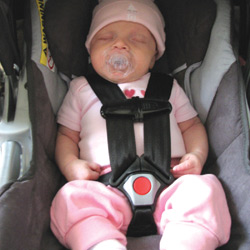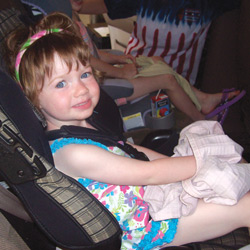
“Mommy, can you fix it?”
These are words no parent wants to hear following a fall from a tree, bicycle or swing. But when the summer sun comes out, so do children, complete with that carefree innocence that sometimes ends with them covered in Band-Aids.
Fortunately, most of these injuries are not serious. However, it is important for parents and caregivers to be aware of how quickly a fall can turn into something much more serious than a bruise or scratch.
“Every year, accidental injuries cause about a third of all deaths in children under 14,” says Dr. Teresa Riech, assistant director of Pediatric Emergency Services at OSF Saint Francis Medical Center.
 Children don’t have to be able to run and play in order for an injury to occur. Yvette Whitehurst, manager of Advocacy Services at Children’s Hospital of Illinois, has dedicated her life and profession to educating children and families about injury prevention. The main focus is car seat safety.
Children don’t have to be able to run and play in order for an injury to occur. Yvette Whitehurst, manager of Advocacy Services at Children’s Hospital of Illinois, has dedicated her life and profession to educating children and families about injury prevention. The main focus is car seat safety.
“The problem isn’t necessarily whether or not parents have a car seat, but whether or not it is installed properly,” Whitehurst said. “Four out of five car seats are not installed properly, which could lead to severe head, neck and spinal injuries.”
The American Academy of Pediatrics recommends that children remain in rear-facing seats until they are two years old. Whitehurst and her team host 36 car seat clinics a year, featuring certified car seat technicians who educate parents about the proper fitting of the seats, in addition to giving them tools to keep their kids safe.
The Advocacy department also oversees a Special Needs Child Passenger Safety Program for infants born with an extremely low birth weight or who are otherwise unable to fit in a regular car seat. They require specially made seats, which are expensive.
“We offer a loaner program for these specialized seats, as well as education for the parents about how to use them and keep their child safe,” said Whitehurst, one of only two instructors in Illinois who are certified for this program.
With the summer season also comes an increase in children riding bicycles. The “Under Cover” helmet program provides bike helmets to 10 schools every year, complete with proper fittings and safety presentations. “A helmet is an inexpensive safety measure, but may save your child from a traumatic brain injury, even death,” says Dr. Riech. “Many manufacturers offer inexpensive helmets that are safety certified.”
Community bicycle rodeos are held at 4H fairs throughout the summer using interactive activities to show kids how their brain would function with an injury.
But even with all of these tools and programs to help prevent injuries, there is no way to prevent them entirely. And while no parent ever wants to make a trip to the emergency room, that trip is easier with the confidence they are giving their child the best care available.
“Since it opened in August 2010, the new Emergency Department at OSF Saint Francis has offered family care in a unique, state-of-the-art facility,” Dr. Riech said. “In our Pediatric Emergency Department, rooms are child-friendly, and staff is specially trained to care for children. We have pediatric experts in most fields, and we know what it means to be ‘child-centered.’ We have the only Pediatric ED in the area.”
An injury to a child is always a scary thing, especially when you feel helpless to “fix it.” Parents should feel confident they will get the best education, tools and medical care to help every time. iBi

